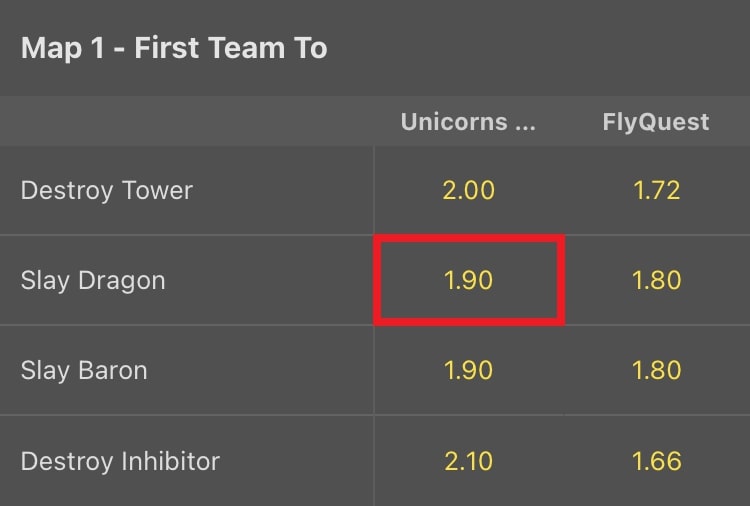Dutching is a must-learn strategy for matched bettors. It’s a technique that comes in really handy from time to time, so it’s well worth learning the ropes.
In this guide, I’ll explain what dutching is and show you the different scenarios where it can help maximise your matched betting profits.
What is dutching?
Dutching is a betting strategy that involves placing bets on all selections within a market so that the returns are the same no matter the outcome.
It’s similar to traditional matched betting but without placing any lay bets. Instead, you cover all selections with back bets, usually at different bookmakers.
The term ‘dutching’ originates from American mobster Dutch Schultz, a numbers racketeer in the early 1930’s. Schultz enlisted the help of a maths whizz accountant, who could tell him how much to stake at the racetrack to manipulate the odds at the last minute. With control of the winning racket numbers, Schultz secured himself a multimillion-dollar fortune.
How to dutch
Dutching is just another form of matched betting. You place your initial bet and then cover the other outcomes within the same market at another bookmaker.
To make an equal profit or loss, no matter the outcome, you need to stake different amounts on each selection, depending on the odds.
I’ve created a Dutching Calculator that takes care of the numbers for you. Enter your initial stake and odds, and the calculator will tell you how much to stake on each selection.
Example
Let’s imagine you’ve seen the following offer at ‘Bookmaker 1’…


You look at the available odds and see that Rafael Nadal is priced at odds of 1.50 (1/2) at Bookmaker 1 to win the Final. At another bookmaker (let’s call them ‘Bookmaker 2’), Novak Djokovic is priced at 2.50 (6/4).
So, you place your £10 qualifying bet on Rafael Nadal at Bookmaker 1.

Place £10.00 on Rafael Nadal @ 1.50 = Potential profit of £5.00
You now need to know how much to stake on Novak Djokovic at Bookmaker 2, and this is where the Dutching Calculator comes in!
You select the ‘First Selection’ target and ‘Standard Bet’ bet type and input your initial stake and odds for both bookmakers.
As you can see, the calculator tells you to stake £6.00 on Novak Djokovic at Bookmaker 2.

Place £6.00 on Novak Djokovic @ 2.50 = Potential profit of £9.00
Let’s have a look at your overall potential profit/loss for each outcome.
So, no matter who wins, you’ll make a small loss of £1 in qualifying for your £10 free bet. Congratulations, you’ve dutched your first bets!
It’s worth mentioning at this point that dutching isn’t limited to sports where there are only two outcomes. For example, you can use dutching to cover all three outcomes of a football match (home win, away win and a draw) or every runner in a horse race. Select ‘+ Add bet‘ on the calculator to add more selections.
When should I dutch?
Dutching is always an option, though it’s generally easier and cheaper to lay your bets at a betting exchange.
However, there are instances where dutching makes perfect sense, so let’s look at those now.
Dutching instead of laying
Sometimes, it’s just not possible to lay your bets at a betting exchange. When this happens, dutching can be the perfect alternative, so it’s a handy technique to have up your sleeve, ready for when the right offer comes along.
Let’s take a look at some example scenarios.
1. Tennis retirement rules
Tennis offers are pretty popular in the matched betting world, especially when the Grand Slam events come around. Each of the four Grand Slam events is played over two weeks, giving you plenty of chances to profit across hundreds of matches.
There’s a snag, though.
The first thing to consider with any tennis offer is whether or not the bookmaker’s retirement rules match those of the betting exchange. If their rules differ, the bets you’ll be matching against each other won’t be like-for-like, leaving you exposed to a hefty potential loss.
Take the following tennis offer from 10Bet.


They’ll give you a £5 free bet if you bet £30 or more.
10Bet’s retirement rules
‘If the full statutory number of sets hasn’t been completed, all bets will be deemed as void.’
Betfair’s retirement rules
‘If a player or pairing retires or is disqualified in any match, the player or pairing progressing to the next round (or winning the tournament in the case of a final) will be deemed the winner. However, if less than one set has been completed at the time of the retirement or disqualification, then all bets relating to that individual match will be void.’
In summary, they have different rules, which means you would be putting your money at risk. If your player’s opponent retires after the end of the first set, 10Bet would void your bet, and you would lose your lay bet at Betfair. On the flip side, if your player retires after the first set, you would make a nice profit.
So, it can swing both ways, and some are happy to take the risk. Dutching eliminates that risk, though, provided you dutch your bet at bookmakers with the same retirement rules.
At the time of writing, I’ve found the following odds at 10Bet and William Hill, respectively, for a match between Diego Schwartzman and Hubert Hurkacz.




So, you enter your £30 Hurkacz stake and both sets of odds into the Dutching Calculator.
As you can see, the calculator tells you to stake £50.64 on Schwartzman at William Hill, which results in a small overall loss of £1.14, with your £5 free bet to come.
It’s worth noting that the Dutching Calculator also has a ‘Free Bet’ bet type, which you can use when converting tennis free bets into cash.
2. No available lay market
It’s not unusual to see offers that feature obscure markets or lesser-known sports. You’ll find that suitable lay markets aren’t always available at the exchanges, and this is where dutching can save the day. If other bookmakers are covering the same sport and have the same market, you’ll be able to dutch your bets and still profit from the offer.
Take a look at the following esports offer from Midnite.


Midnite will give you a £10 free bet if you bet £10 on any Dragons market. The betting exchanges don’t cover Dragons markets, but fortunately, some other bookmakers cover esports.
At the time of writing, I’ve found the following ‘Team to Slay First Dragon’ odds at Midnite and bet365, respectively, for a match between Unicorns of Love and FlyQuest.




So, you enter your £10 FlyQuest stake and both sets of odds into the Dutching Calculator.
As you can see, the calculator tells you to stake £9.89 on Unicorns of Love at bet365, which results in a maximum overall loss of £1.10, with your £10 free bet to come.
3. Matched betting outside the UK
Unfortunately, betting exchanges don’t offer their services to everyone around the world. Betfair and Smarkets both have a list of prohibited countries. If your country of residence is on the list, it means you won’t be able to register and place any lay bets.
All is not lost, though, as dutching may offer you a glimmer of hope. Suppose you can find different bookmakers that cover the same events and markets. In that case, you should be able to dutch your bets and take advantage of any bookmaker offers you can find.
Arbitrage dutching
Arbitrage dutching is the traditional form of dutching, dutching for profit. If bookmakers set their odds too high compared to the rest of the market, it can present an opportunity to make a quick profit. Such opportunities are known as ‘arbs’.
Whether you’re laying them off at an exchange or dutching them at another bookmaker, taking arbs can draw unwanted attention to your account. You should, therefore, never take arbs on any of your profitable accounts, as it’s not worth the risk.
You probably won’t use arbitrage dutching all that often, but it can be great for squeezing value out of any gubbed accounts you may have. The same goes for any bookmakers that don’t usually run promotions.
The maths behind arbitrage dutching
There is an arbitrage opportunity if the probabilities of all selections within a market add up to less than 100%.
To calculate the implied probability of an outcome, you divide 100 by the decimal odds.
Let’s say, for example, Red Rum has odds of 1/3 to win a two-horse race against Tiger Roll, who himself has odds of 10/3.
100 ÷ 1.333 = 75% (Red Rum)
100 ÷ 4.333 = 23.08% (Tiger Roll)
75% + 23.08% = 98.08% (Total)
As you can see, their respective chances add up to less than 100%, which means there’s an arbitrage dutching opportunity.
When using my Dutching Calculator for arbitrage dutching, you can choose between three different ‘Targets‘…
- First Selection
- Total Stake
- Overall Profit
Each setting enables you to fix a particular part of the dutching process. Let’s take a closer look at each one now.
First Selection
The ‘First Selection‘ setting allows you to enter the amount you wish to stake on the first selection. This amount will stay the same no matter the odds or number of selections being dutched.
Here’s an example featuring three selections with respective odds of 2.00, 5.00 and 10.00.
As you can see, your fixed stake for the first selection is £10. The calculator then gives you the stakes for your other two selections, ensuring that you make an equal profit no matter the outcome.
Let’s have a look at your overall potential profit/loss for each outcome.
As you can see, you’ll make a profit of £4 no matter the outcome.
You need to be aware that by fixing the stake of your first selection, your total stake will increase as you add more selections.
Total Stake
The ‘Total Stake‘ setting allows you to enter the total amount you wish to stake across all selections. This amount will stay the same no matter the number of selections being dutched.
Here’s an example featuring the same three selections as above.
As you can see, your fixed total stake is £10. The calculator has given you the stakes for each selection, ensuring that you make an equal profit no matter the outcome.
Let’s have a look at your overall potential profit/loss for each outcome.
As you can see, you’ll make a profit of £2.50 no matter the outcome.
If you were to add more selections, your stake on each selection would reduce to ensure that your total stake remains the same.
Overall Profit
The ‘Overall Profit‘ setting allows you to enter the amount of profit you wish to make no matter the outcome. This amount will stay the same no matter the number of selections being dutched.
Here’s an example featuring the same three selections as above.
As you can see, the calculator has given you the stakes for each selection, ensuring that you’ll make an overall profit of £10, no matter the outcome.
Let’s have a look at your overall potential profit/loss for each outcome.
As you can see, you’ll make a profit of £10 no matter the outcome.
If you were to add more selections, your stake on each selection would increase to ensure that your overall profit remains the same.
Final words
In terms of matched betting offers, dutching is probably more helpful now than it ever has been. As bookmakers continue to tweak their promotions and cover different markets, dutching will open doors for you that would otherwise be closed.
It’s also pretty satisfying to squeeze some extra value out of your gubbed accounts that are otherwise doing nothing.
Next time an opportunity comes along, give dutching a go and start maximising your profits!
Learn matched betting the free, easy way.
The Matched Betting Academy
- Logically structured to tackle strategies and offers as you’re ready for them.
- Bag profits every step of the way. About £600 from welcome offers, and another £500 monthly.
- Make £15 from your very first offer.

Got a question?
Leave me a comment below…
I usually respond within 24 hours.
Matt Kirman – Matched Betting Blogger
Since 2014, I’ve blogged over £85,000 worth of profit, and made it my mission to make matched betting accessible to everyone.